BEIJING LOSES BID FOR THE 2000 OLYMPICS
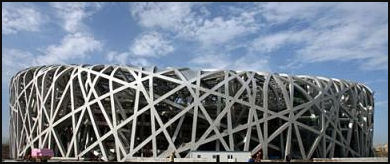
Bird's nest stadium Beijing bid to host the 2000 Olympics. Even though it was the sentimental favorite it lost out to Sydney, Australia by two votes. Many believe that Beijing lost its bid because of China's human rights record. Beijing blamed "anti-China" elements in the U.S. Congress. Later it was revealed that the day before the voting, the Sydney Olympics committee offered to donate $35,000 to charities controlled by two African IOC members if Sydney won.
Beijing pulled out all the stops in it effort to win the bid. On the eve of the visit to the city by International Olympic Committee selection committee, political prisoners were released, stray dogs were killed to get them off the streets, fines were issued for spitting, pot holes were patched, squatters shacks were ripped down, and street children and homeless people were trucked out of the city. One homeless man was beaten to death. Many city residents had their hot water and heat turned off so the committee wouldn't see the pollution caused by heating coal.
In 1990, Beijing hosted the Asian Games partly to show it was capable of hosting the Olympics. Security was so tight at these games the families of many athletes were not able to watch the athletes perform. To help pay for it, workers were coerced into making "voluntary" contributions.
Beijing didn't bid for the 2004 Olympics because the number "4" is considered as an unlucky number and Athens was the favorite. It waited to bid for 2008, in part because the "8" in 2008 is viewed as more lucky. Even before the selection process had begun, Beijing had chosen a symbol for the Olympics — the five Olympics rings and colors twisted into a tai chi action figure. The slogan for the bid was "New Beijing, Great Olympics."
Beijing Bids for the 2008 Olympics
As part of the campaign to win the 2008 Olympics, 10,000 cyclists rode together through Beijing waving flags that read, "I will do my part for Beijing's bid" and 200,000 people unfurled a 6,000-foot banner at the Great Wall covered with signatures. A special clock was installed on Beijing's Wangfujing Street that ticked off the days until the IOC selected the 2008 host city.
Members of the International Olympics Committee (IOC) selection team visited Beijing in the middle of winter. Even so they were driven down a route with green trees, flowers and grass that had been dyed a shocking color of green. Traffic lights were programmed to turn green when their cars passed. Drab apartment buildings were given coats of pink, blue, and lime green paint. Taxi drivers were given special instructions to be especially nice to foreigners when the IOC was in town.
Beijing spent $24 million on its Olympic bid, much of it subsidized by foreign corporate sponsors. On the eve of the IOC visit, as was the case the 2000 bid, Chinese were urged to stop spitting, factories stopped belching out smoke, and homeless people and dogs were taken away. In addition, acclaimed film makers like Zhang Yimou made commercials shown to IOC members, "four-star public toilet facilities" were constructed and the "Three Tenors" performed a concert in the Forbidden City to bring international attention to the bid.
Beijing Gets the 2008 Olympics
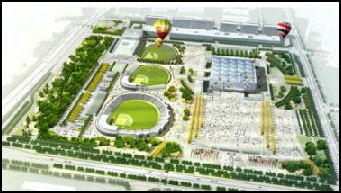
Polls showed that 95 percent of the Chinese public supported Beijing's bid for the 2008 Olympics. Even people who were to be evicted from homes to make way for event sites supported it. But these sentiments were not shared by everyone. Some members of the U.S. Congress campaigned against China's Olympics bid on human rights grounds. Some complained that the Communist leaders would use the Olympics to showcase their government the same way the Nazis did in Berlin in 1936. The Bush administration decided to remain neutral.
Chinese dissident Wei Jingsheng wrote, "I opposed China being awarded the Olympics because for the leadership of the Communist Party, everything is political. Having the Olympics for them is not about sports: it is a way to fan ultranationalism and xenophobia at home."
Human rights organizations flooded IOC members with e-mail, The strategy seems to have backfired. One IOC member told the Los Angeles Times, "The anti-China lobby is being very stupid. The lobby is antagonizing people." Among those that supported the Beijing bid were the Dalai Lama. He said Beijing "deserves to be the Olympics hosts." IOC President Juan Antonio Samarch also has been a loyal supporter of Beijing.
On July 13, 2001, China was selected to host the 2008 Olympics. It won in the second ballot with 56 votes. It rivals Toronto, Paris and Istanbul received 22, 18 and nine votes respectively. Osaka was eliminated in the first round.
After the decision was announced, ordinary Chinese took the streets, cheering and waving Chinese flags. Fireworks and laser lights illuminated the skies over Beijing. The winning of the bid was a personal victory for president Jiang Zemin. The Chinese promised to stage the best Olympics ever and made it a matter of national pride and unity to do so. The terms of the contract between the IOC and the Chinese government were never made public.
Preparations for the 2008 Olympics
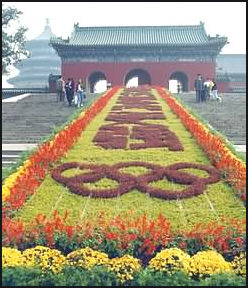
The Beijing Olympics was organized by the Beijing Olympic Committee for the XXIX Olympiad (BOCOG), headed Liu Qi, Beijing’s Communist Party Secretary. Three years before the event was scheduled to begin Beijing was already filled with posters emblazoned with the slogan “One World, One Dream.” In August 2007, IOC President Jacques Rogge said that preparations were “truly impressive in every regard.”
Inspectors were out in force making sure restaurants, food stalls, public baths and swimming pools were safe and disease-free and met international standards. Kitchens were guarded and refrigerators were monitored with video cameras; inspectors were sent to the farms and slaughterhouses that produced the food; and delivery trucks were tracked with GPS devices to prevent food tampering. White mice were designated as the official Olympics poison testers in part because results were known within 17 hours, faster than other methods such as bacteria cultures. Beijing even set aside several thousand hospitals beds in several dozen hospitals in the event of an outbreak of an infectious disease during the Olympics.
To make visitors feel comfortable thousands of new public toilets were installed and chrysanthemums were crossbred to bloom in August. To make young people more aware of what the Olympics is all about secondary school students were required to take a course on Olympics knowledge, whose contents were tested on the university entrance exam. Taxi drivers were required to take courses in basic English.
Continency measures considered included hospitalizing the mentally ill. relaxing restrictions on religious services, and temporarily closing down many businesses and factories. There were also plans to banish migrant workers, AIDS activists, Falun Gong members, disabled people from Beijing during the duration of the Olympics. Special lanes were built on roads, designated for athletes and tourists so they were not late for events. There was a string of venues and a new park in the shape of dragon following a “dragon vein,” which feng shui masters set up on Beijing’s north-south axis to bring good luck.
More than 40 million plants were placed on the road to the airports and in baskets in the median in major downtown streets; toll booths were fitted to look like pagodas and toll takers were dressed in special satin blouses; flight attendments gave out small Chinese flags and led passengers in cheers; elementary school students studied the Olympics for several years with each school in Beijing specializing in a specific country and welcoming members of that country’s Olympics team when they came to Beijing;
Security concerns, in the eyes of some, turned the Games into the “no-fun Olympics.” Restaurants took dog meat off their menus; shops pulled pirated discs and clothes (and placed them in backrooms). Curfews imposed in bars forced them to close at 2:00am; barbecue restaurants were closed for producing polluting smoke; entertainers had to present scripts of their performances for approval. A preview performance of “Hairspray” was raided because it lacked an approved security plan.
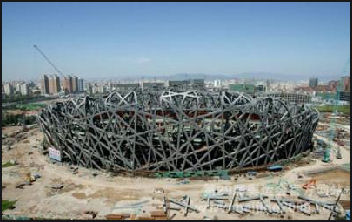
An efforts was made to teach English to the city’s taxi drivers and to get them to stop eating foods that gave them garlic breath. Some restaurant were required to replace squat toilets with Western models and post “no prostitution” and “no gambling: signs. Other were told to limit the amount of alcohol served to customers, remove outside tables and prevent displays of affection in public. Special lanes were set up for Olympic buses. Around 80 billion gallons of water was diverted to Beijing through a series of hastily built canals, some built only months before the Games began. Some of the water was brought in from areas with water shortages, exacerbating drought conditions there.
Beijing became one big Potemkin Village. Walls like those around hutongs were put up with no hutongs behind them to somehow make up for all the hutongs that were torn down. The hutongs that survived were spruced up with repaved roads, new sewage lines, overhauled roofs and renovated houses. Local residents were unhappy with some preparations, particularly construction noise, restrictions on driving, searches at subway stations and the empty express lanes next to lanes of gridlocked traffic.
People Sacrificed During the 2008 Olympics in Beijing
Beggars, migrant workers and homeless people as well as some masseuses and fortunetellers were rounded up and taken out of the city; workers at factories were furloughed; entire neighborhoods were demolished to make way for new building with holdouts having their homes bulldozed down in the weeks before the Games.
Migrant workers were not directly forced out but heavy pressure was put on them to leave. There was no work for them during the Olympics and in the run up to it.
As tourists began arriving at Beijing International Airports migrants filled up the train stations, taking the trains out. Many simply didn’t make enough money and had no place to stay to ride out the Olympics. Many moved on to other cities where there was work. Other left out of fear, worried that if the police found them without residency permits they would get stuck with a big fine. Many decided to make the most of the break and return home and spend time with their families. Many watched the Olympics on television in their home villages. A few even used the time off as opportunity to get married.
Villagers in villages whose water was diverted to Beijing for the Olympics saw their crops wither and pond fish die. Even so many did not complain and said they were happy to make a sacrifice for the motherland and its moment of Olympic glory. One farmer in a village 155 miles from Beijing that saw its irrigation source dry up told the Washington Post, “This is a small thing for individuals. We should make contributions to the country. I understand — we are a socialist family.”
Security and the 2008 Olympics
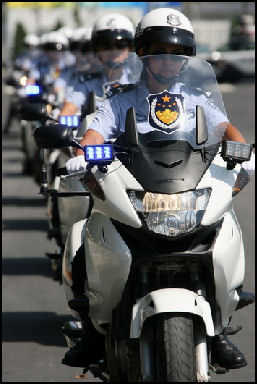
Around 90,000 police and thousands of military and border troops were deployed in Beijing during the Olympics. More than 600,000 “security volunteers” — mostly retirees, guards and students — were lined up to assist police, troops and other security forces. Details of how they were all be deployed were state secrets. The government has said that $300 million will be spent on security, a fraction of the $1.8 billion spent in Athens in 2004. Experts have estimated that China's total budget for security is around $1.3 billion.
The usual police — mostly blue-uniformed traffic cops “were beefed up with paramilitary officers and soldiers, white-shirted security guards and armed police that stood unflinching at attention for hours. Primary responsibility was given to the People’s Armed Police, who dealt most directly with spectators, athletes and journalists, It was unusual for the Chinese military and police to be on such a high alert. A 400-member special patrol was put in charge of guarding key power transmission lines.
More than 34,000 military personnel, 74 airplanes 47 helicopters and 33 naval ships were deployed in the Beijing area. Security was tight at airports all over China; certain liquids including alcohol were banned from all Chinese trains. Security inspectors were placed on all 4,000 buses in Urumqi in Xinjiang, where many Muslim Uighurs live.
China’s spy network is also reportedly gearing up for the Games. The French journalist Roger Faligot, author of “The Chinese Secret Service from Mao to the Olympics”, said special teams have been set up abroad to identify troublesome journalists and human rights activists and a network of spies and technology has been set up to monitor them when they are in China.
“Security volunteers” were identified with red armbands. One of them told the Washington Post, “We always stand at the gate of our compounds, and when we see strangers that look like bad people we will ask them what they are doing." One stationed near Tiananmen Square said, “If we see petitioners carrying a banner, definitely we must stop them.” When a policeman was asked how he would deal with foreign protestors, he told the Washington Post, “We will bring foreign protestors to the security office politely. There security officers who speak their language will talk to them.”
Security at the Games included random checks in Tiananmen Square and major transportation hubs; random night checks of motorist’s documents; and subway searches for flammable liquids. Chinese living outside of Beijing needed approval to enter the city. American tourists were warned their hotel rooms might be monitored or bugged. After the Tibetan protest in March 2008, security was stepped up in airports and potential trouble spots.
There were rigorous security checks not only at airports but also at major subway stations, where more than a million passengers a day passed through metal defectors. About 6,000 police rode Beijing’s 18,000 buses and another 30,000 checked bus stops and terminals. Thousands of cars and trucks entering the city were checked. Armed guards were deployed at the Beijing Airport.
There also seemed to be a ban on having a good time. Foreign performers and entertainers were warned not to tarnish China’s image. Music festivals were cancelled and bars that have live music were suddenly told they need a license. For musical performances ro be authorized, lyrics had to be checked in advance and permission was needed for encores. Authorities swept through the streets, cleaning them of counterfeit goods. Sleeping outdoors, flying kites and homing pigeons, and wearing identical shirts were prohibited. There was a ban on promotions based on security concerns over large gatherings of people. Retailers lost money because of the prohibitions.
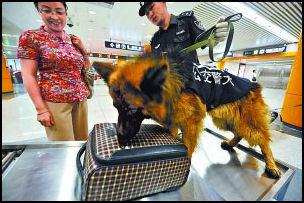
Publicly-shown drills with commandos rappeling down towers before the Olympics was intended to show that security forces would be ready and the chances of terrorist attacks were next to nil. One policeman told the Washington Post, they would not tolerate protests “harmful to the country’s security, sovereignty and land integrity.” In the run up to the Olympics dissidents were detained, papers and residency cards were checked; house-to-house searches were conducted; surveillance cameras were installed in all kinds of places; and observances of websites, chat lines, telephone calls, E-mails, cell phone calls and text messages have been stepped up.
By some estimates $6.5 billion was spent on security for the Olympics. A large chunk of money was spent on a video monitoring system described as “most comprehensive and sophisticated surveillance system ever.” Tens of thousands of surveillance cameras were st up: on lampposts, in bars and Internet cafes with a total of 300,000 cameras in place at the time of the Opening Ceremonies. By contrast, Manhattan is expected to have only 3,000 high-tech surveillance cameras in place by 2010.. IBM, GE, Honeywell, and United Technologies supplied the latest computer tools to automatically analyze video images and alert computer operators to potential threats. The system continued to be used after the Olympics were over.
The athlete’s village was enclosed by a wall and two lines of high-security fencing. Strict credential and bag checks were carried out for anyone entering the area. A small missile base was built on a site adjacent to the Olympic venues. Surface-to-air missiles were aimed in the skies over the Olympic stadiums. Members of the Hash Harriers, a beer-drinking running club, were questioned on suspicion that flour used to mark their course might be part of a terrorist scheme. More than 10,000 knives were confiscated at subway station security checks. One Air China jet was forced to land in Japan after a bomb threat was e-mailed to the airline soon after the plane took off from Beijing. Four other planes were delayed because of the threat.
Etiquette, Rules and the 2008 Olympics in Beijing
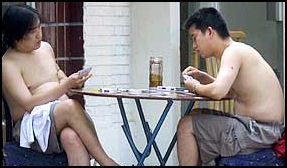
Etiquette posters plastered around Beijing listed the “Eight don’t asks,” which included not asking people their age, income, political views, religious beliefs or about their health, love life or personal experiences. The posters were part of an effort by a local propaganda department to instruct Beijing residents how to properly welcome foreign visitors. One official said, “It is normal for Chinese to ask people they met such questions, but foreigners respond negatively to such questions. By educating locals, we hope that they will become more socially sensitive when communicating with visitors.”
Similar posters were put up on how address foreign disabled people during the Paralympics. One of these advised people not to use phrases like “it’s over there” and “it’s up there” when talking to visually impaired people
Posters around the Bird’s Nest stadium read: “The following actions are considered inappropriate and will be stopped at the venues...deliberately displaying and promoting commercial logos on clothing, accessaries or other items; wearing clothing with identical or similar designs, color combinations.” Among the other things that were both tolerated were “using flash photography, attending events inebriated and/or disobeying instructions given by staff...opening umbrellas, standing for long periods in seating areas or behaving in manner that may disturb others or block others” view.
Among the “strictly prohibited” behaviors were “any publicity, promotional, demonstrations and fund-raising activities including but not limited to commercial, religious, political, military, territorial, human rights, and animal and environmental protection activities.” In pamphlets given out to Beijing residents men were advised not to wear white socks with dark shoes, older women were told not to wear miniskirts and homeowners were told not to throw trash in the gutter, play cards in the street or hanglaundry from their windows or balconies, especially underpants.
Prime Minister Wen Jiabao pronounced the Olympics “smoke free.” Cigarette billboard advertising was banned during the Games. Taxi drivers were told they couldn’t smoke and had to wear a special uniform and keep their shirt tails tucked in. More than 17 million people logged on to an online program that offered advise on things like what color socks to wear with a dark suit (dark), how to act when receiving a present from a foreign visitor (open it in front the giftgiver and express delight) and which seat in the car to give honored guest (the right side of the back seat). A CCTV television show instructed Chinese how to properly greet visitors of different nationalities. A study by the sociology department at Beijing People University devised a “civil index” test and said scores on it improved from 65 in 2005 to 72 in December 2007.
Civilization Campaigns Before the 2008 Olympics
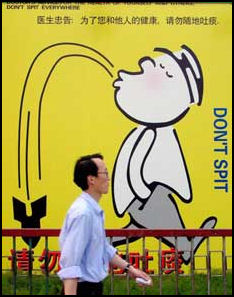
Anti-spitting poster
Beijing launched a major “civilization” campaign aimed at reducing spitting, litter and impolite behavior in the run up to the 2008 Olympics. The city set up special trash boxes and provided sanitary bags for people to spit in and given police the authority to impose fines of $5 for spitting.
Beijing tried to get rid of signs with embarrassingly bad English (See Language). Newspapers were informed people that it was unacceptable for men to parade around outside without a shirt, even when the weather is really hot. See Etiquette, Customs.
In December 2006, a Chinese Communist Party official promised a “clean” Olympics and warned government officials not to be “dissipated by wine and women” and “not visit entertainment venues after work” and embarrass China during the Olympics. The announcement was made after a Beijing vice mayor Liu Zhihua, who oversaw Olympic construction. was sacked and charged with taking bribes. According to state television Liu took “several million yuan in bribes and helped his mistress to seek profits in projects.”
Officials also said they would do something about smelly taxis, crack down on abusive nationalism and get volunteers to root for opposing sides. To get local people to break the habit of forming rugby scrums rather than lines the 11th of every month has been declared “queuing day.”
Organizers said the Olympics would be smoke free. Smoking was not allowed at the sites or in the Olympic Village. Smoking was a target of the etiquette campaign in Beijing in the run up to the Olympics. Beginning in May 2008, smoking was banned in all government offices and on public transport with violators facing a punishment of up to $700. Smoking continued to be allowed in restaurants, bars and clubs but these places had to provide smoke-free areas. Hotels had to offer smoke-free rooms. Smoking was already banned in cinemas, sports arenas, airports and railway station. Smoking in taxis was banned in October 2007.
Torch Relay on Mt. Everest
Dubbed the “Journey of Harmony,” the Beijing Olympic torch relay lasted 130 days and reached 20 countries, five continents and the summit of Mr. Everest, with stops in London, Paris, Pyongyang and San Francisco and other major international cities. It was originally planned to involve more than 21,880 torchbearers and cover 137,000 kilometers, making it the longest torch relay with the most torch bearers ever, but plans were scaled back after protests along teh relay route over the Tibetan issue.
The Olympic torch itself was 72 centimeters tall and designed to withstand wind and rain. The official Olympic flame for the torch arrived in Beijing from Greece on a chartered Air China Airbus A330, decorated with an Olympic flame. The first person to meet the plane was China’s security chief. The flame was then carried in a special van, protected by a six-vehicle convoy, on a secret route into central Beijing. Several reserve lanterns, each with a “mother flame” lit in Greece, accompanied the relay in case the torch went out.
The torch was taken through Lhasa in Tibet in June. The route in Tibet was shortened from three days to one day. The Chinese government warned that anyone who disrupted the torch relay in China or Tibet faced severe punishments. Both China and Nepal put Everest off limits during the Olympic torch relay. Some foreign journalists were denied access to the Everest area. The send off ceremony at the Everest base camp was canceled.
The Olympics torch was taken up Mt. Everest in May by a 31-member mountaineering team, and was photographed on the summit with Chinese and Olympics flags. The Olympics flame was carried in a special canister and passed to the torch with a special wand when the torch neared the summit. The torch was specially designed so the flame would stay lit in extremely cold, windy conditions with little oxygen.
There were plans to put in a 67-mile paved road to Mt. Everest base camp to make it easier to move the Olympic torch. These plans were put on hold in July 2007. Two cameramen and a CCTV broadcaster trained two years for the Everest ascent.
Volunteers and Pretty Girls at the 2008 Olympics in Beijing
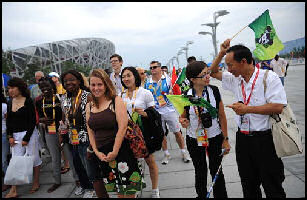
More than 1.5 million people served as volunteers, including 75,000 official guides and translators, 400,000 people who worked at 550 service centers outside the event venues, and 1 million who were not official volunteers. The later group included those involved in public safety and doing neighborhood watch duties. Over 4 million Chinese have received English-language training to help visitors and 320,000 people applied for the 75,00 official guide and translator positions at the Olympics.
The official volunteers were mostly Beijing natives and university students. Close to 90 percent were in their 20s. Successful applicants had to pass two rounds of written exams and interviews. At Tsinghua University 10,000 people applied for 700 positions, some of them for things like stopping traffic and managing parking for the race walking events, and students fought hard to get the positions. The test measured proficiency in English and Olympic knowledge. Those from outside Beijing had to pass tests on Beijing.
The 380 women selected as the hostesses to give out medals at the awards ceremonies were required to be tall, beautiful and have attractive figures. A director with the Beijing Olympics organizing committee told the Washington Post and news services, “Candidates should be 5 feet 6 inches to 5 feet 10 inches tall. That’s above average...Generally speaking, they can’t be too fat. Their figure should be good. They shouldn’t be too heavy...Of course the girls should be young and pretty...We have requirements for their height and figure because we have to make clothes for them....And they need to have a strong comprehensive quality. Since medal presenting is hard work, they not only need beautiful faces but also need to be strong enough.”
The training for award-giving hostesses included walking with books balanced on their heads and with pieces of paper squeezed between their knees. A perfect smile with six to eight exposed teeth was achieved by practicing in front of a mirror with chopsticks placed between the teeth. One 16-year-old trainee told AP, “I practice at home, and smile to the mirror for an hour every day. I want to present my smile to the world. And let them know that the Chinese smile is the warmest.”
Cheerleaders at the 2008 Olympics in Beijing
More than 210,000 Chinese were trained as cheerleaders for the 2008 Olympics. Most were retired state employees who have been given matching T-shirts and props such as flags, handkerchiefs and inflatable, batlike “cheering sticks.” [Source: Washington Post]
Many of cheerleading squad — such as the Beijing Workers Cultural Progress Cheering Team — were organized by the Beijing Federation of Trade Unions and were made up mostly of women . During their training sessions hundreds of former office workers and state employees shouted “Higher! Higher! Faster! Faster! Stronger! Stronger!” while making a thundering noise by slamming their cheering sticks together. Posters encouraged them “to demonstrate the enthusiastic spirit of the people.” The whole thing reminded some of the “model operas” and “loyalty dances” of the Cultural Revolution.
One Chinese sociologist told the Washington Post, “organized cheering groups show the strong ability of the government to call on ordinary people for help. In the West, it’s unimaginable.”
Maureen Fan wrote in the Washington Post: “China’s political culture places a unique emphasis on group performance. It’s an emphasis that starts as early as kindergarten, dominates the work lives of state employees and is used to demonstrate collective passion, where it might not otherwise exist. To many Olympic visitors the impulse to script and stage manage everything might seem odd. But China has long emphasized ceremony and propriety.”
Daily Life at the 2008 Olympics
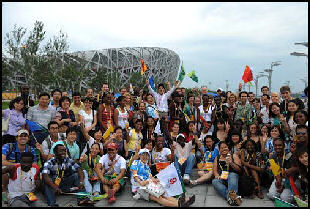
The Beijing Olympics were among the best organized and most efficient ever staged. But some felt they could have used a little more spontaneity and fun. Jere Longman wrote in the New York Times, “The buses ran on time, And there were no long lines at the stadiums...Spectators came and went, orderly, positioning to take pictures in the concrete commons between the Bird’s Nest and Water Cube, but the stadiums felt remote from the rest of Beijing...Any chance the order would be disturbed brought a stern response.”
Budweiser, Yanjing and Tsingtao beers were all available for about $1.25 a cup. Snacks like Yili Yogurt, President Snack Noodles and Box Meal and the Egg were available for less than 2 yuan from food stands that were triple staffed.
Volunteers gave out free ponchos during rain delays, taught fans how to do the Mexican wave and reminded people to bring bug spray. People who went to a lot of events went through a lot of security checks. The metal detectors were very sensitive: in some cases set off by metal burtons on shorts.
Shopping was a major pastime. Long lines formed outside the Olympic Superstore, with 10,000 Olympic products on sale, on the Olympic Green. All kinds of souvenirs, accessories and gizmos featuring the Five Friendlies mascots were available: T-shirts, mugs, umbrellas, stuffed toys, cell phone accessories, mouse pads, shot glasses, key chains, towels, dolls. Among the big ticket items were a gold-plated, rhinestone-encrusted Temple of Heaven models with the Five Friendlies posing in front for $2,400 and gold-plated replicas of the Bird’s Nets stadium for $214. Huan-huan, the Olympic flame, was said to be the most popular of the Five Friendlies,
Most of the economic activity in Beijing was relegated to places around the Olympic venues, Many places — including the Sanlitun entertainment district’said they had less business during the Olympics than they normally do.
Friendliness and Manipulation at the 2008 Olympics
Jere Longman wrote in the New York Times, “One thing that did transcend the studied nature of these Games” was “the openness and affability and kindness of the Chinese. Sure, some of it was constructed...But there seemed nothing insincere about their welcoming and gracious behavior. Thousands of young volunteers were eagerly helpful, always smiling. Inside the Bird’s Nest and Water Cube, fans roared and cheered for everyone...It was impossible to enter the restroom at the press center without a volunteer waving you inside, then breaking out the official Olympics squeegee to dry the sink when you left.”
Thomas Boswell wrote in the Washington Post that the Olympics were a “splendidly pretty, sparsely attended, completely controlled sports event...Everything that met my eyes at every venue was perfects, Everyone smiled...Everyone pretended to speak English. Until you got past “hello.” Everyone was helpful until you went one inch past where you were supposed to go. Then, arms sprang out to stop you. Everywhere you went, even alone at 2 a.m.. You felt completely safe. Because every hundred feet there were a pair of guards — at attention in the middle of the night...As sports spectacle go, I’ve never seen one more efficiently or soullessly executed as this one. I have no idea where they put the real people for 17 days, but I felt like Jim Carey in “The Truman Show”.
One Belgian visitor told the Washington Post, “It’s very oppressive here. They make too much effort to make everything perfect.” An English visitor said, “I am constantly get the feeling that I shouldn’t say anything that would be a slur against China...I’d like to come back after the Olympics and see what it’s really like.”
Excitement Over the 2008 Olympics in Beijing
Children had their heads shaved except for the Olympic rings. A woman who gave birth to quadruplets on August 8th, the day of the Opening Ceremonies, named her children Welcome, To, Beijing and Olympics.
Many young couples made an effort to get married on the day of the opening ceremony — 8,8 08. Dates with eights are viewed as especially auspicious for weddings because eights, like knots, representing a successful union. More than17,000 couples tied the knot in Beijing. There were stories of couples waiting overnight in line outside marriage registration offices. Couples that wanted an Olympics tie-in but couldn’t managed to get hitched during the Olympics had their wedding photographs taken in from Birds Nest stadium and other Olympics venues or had photos doctored with Photoshop to look as if they were standing in front of the venues. Studios typically charged around $300 for a set of Olympic venue photos.
A 32-year-old industrial designer that proposed to his girlfriend of eight years and got married to her on the same day, Opening Ceremonies day, told the New York Times, “I’ve been waiting for this moment a long time. I’m not usually so spontaneous, but we’ve caught Olympic fever.” For their city hall marriage ceremony the couple donned red T-shirts that said “Go China!” Some who got married on that day said they did so as much for the good fortune attached to the day as for its link to the Olympics.
The Beijing Obstetrics and Gynecology Hospital said there was a 20 percent surge in deliveries around the time of the Olympics and they had to turn away mothers who demanded Caesarean sections. Parents who gave birth to children around the time of the Olympics named their newborns after the Olympic Games–“Aoyun” or “Aoyun Hui,” Olympics or Olympic Games in Chinese — or one of the Olympic mascots. Other Olympic-inspired named included “Aobao” (“Olympic Treasure”), “Duoduo (“Many, Many” as in many, many medals). A joke that was circulating around during the Olympics went: “The day will come when the whole town responds when you call to the name “Aoyun!”
Many locals quickly became weary of the whole Olympics thing. Chang W. Lee wrote in the Washington Post, “There is a certain amount of pride that every Chinese person seems to be feeling about the Olympics. It was a chance for the country and the city to show off, but I think for your average Beijing person they’re going to be pretty psyched up when the attention dies down and people just go back to everyday life. Just a big sigh — a sigh of relief.”
Fans and Strange Things at the 2008 Olympics in Beijing
Each sports had its own little weird touches. The beach volleyball venue employed Sandbonies — Zamboni-like devises that smoothed the sand and bug catchers with large nets to snag moths attracted to the bright lights. Water polo players were introduced one at a time in a multitude of language wearing bathrobes and play began with theme from “Jaws” blasting from loudspeakers. Drums filled with water were a fixtures of the swimming events.
The five mascots showed up at many events. They often came skipping into the arena together during down times, waving their arms, doing some cartwheels and martial art poses, forming pyramids, and urging the audience to clap along with them. See Basketball
Many sports had cheerleaders or dancers doing poorly-choreographed routines., The one at the badminton games wore yellow miniskirts and pink shoes and waved around rackets, occasionally bumping into each other.
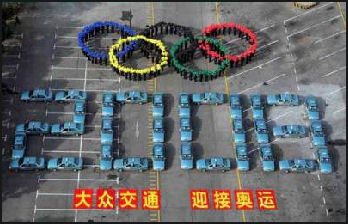
Many fans were armed with whistles and inflatable bats called “la la bang” or “cheering sticks.” Large instructional screens at the top of the arenas told people when to “cheer.” The one at the gymnastic area displayed things like “Wow!” “Fantastic!” and “Wonderful!” Sometimes cheerleaders instructed the crowd on how to do the Mexican wave as if they had never seen it before.
Fans often cheered: “Jia You!”—“Go China!” In schools and on television fans were taught the “Olympic four-step” to make sure the cheering was enthusiastic but orderly. It went something like this: 1) Clap hands and chant “Olympics”; 2) give two thumbs up and cheer: “Go!” 3) clap twice and go: “China”; 4) raise the arms and chant “Go!”
Busloads of “cheer squads” were bused in for some events. Sometimes brought in to fill in empty seats, they were identifiable by their bright yellow T-shirts that read “Cheering from Beijing Workers” in Mandarin and English. Many had matching fanny packs which contained cheering prop props like cheer sticks and banners. The cheer squads were fixtures of the lower profile events and events without Chinese competitors, providing quick bursts of cheers and cheered for everybody. Often they didn’t clearly understand the rules of the sports they were watching and were told which events to attend at the last minute. Many attended classes on how to cheer; others used DVDs to study at home.
Before the Olympics there were worries that fans might be unruly and boo athletes from the United States or Japan or leave in droves after Chinese athletes competed but before other athletes finished. This did not occur. Fans were generally well behaved and courteous and in many cases rooted for non-Chinese athletes and teams almost as vigorously as they did for Chinese ones.
There was a story of one 97-year-old grandmother and badminton fan that came 1,500 kilometers from Hunan Province to watch some of the events. She reportedly got around on a tricycle ridden by her grandson and even secured tickets to see the 110-meter hurdles, the most coveted ticket at the Olympics.
Sell Outs, Tickets and Scalpers at the 2008 Olympics
Tickets ranged in price from $5 for events like baseball to $775 for the opening ceremony. A representative from the Beijing Olympics Organizing Committee promised that 7 million “very, very cheap” tickets would go on sale to the general public so that ordinary Chinese who don’t have much money can attend events. Only a certain number of tickets was allocated to each country. Direct buying was an option available only to local residents of Beijing. The cut off date for the lottery to get tickets was in June 2007. CoSport was the sole official tour operator for the United States. Websites like TicketLiquidator.com sold thousands of tickets given to corporate sponsors.
Internet sales of tickets was fraught with problems. One director at the ticket center was fired. A system was set up to sell tickets on a first-come, first-serve basis over the Internet crashed after the system was overwhelmed with requests — 8 million page views per hour. Telephones were also jammed. The plan was abandoned. Tickets were mostly sold through a lottery and were available at 1,000 branches of the Bank of China. Some waited all night outside the banks to get first dibs on available tickets. In the second major offering of tickets people were able to log on and choose tickets easy enough but were unable reach the payment page and finalize the transaction.
Two weeks before the Games began, officials announced that every one of the record 6.6 million tickets offered had been sold. Despite this there were large number of empty seats at premier events such as swimming events with Michael Phelps. The stadiums at some events such as softball were 70 percent empty. Seats for preliminaries and qualifying rounds were predictably empty. But sell outs were also full of empty seats. Often events had one section of empty seats next to another section filled with enthusiastic fans, wearing matching T-shirts and pounding inflatable cheer sticks. One reason this was so was that seats set aside for corporate sponsors and VIPs were often not used. Fans anxious to get their hands on tickets found this frustrating. One volunteer told the New York Times, “As tickets are really hard to get the fact that some of the best seats remained untaken through the whole Games really upset people who really wanted to see the Games but didn’t have the ticket.”
For premier events foreign and Chinese touts openly sold tickets for more than 10 times their face value despite threats of prison sentences to those caught scalping. At some subway stations there were hundreds of touts offering tickets next to police that stood by and did nothing. One American scalper told AFP, “This is a completely free market. We thought it would be really difficult and people were very nervous for the first few days...but once we realized the police were not going to touch us, everyone flooded in.”
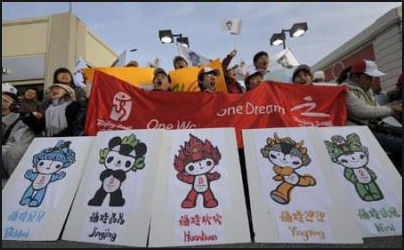
Mascots
Track and field tickets with a face value of 800 yuan that included the 110 meter hurdles were selling for 9,000 yuan until Chinese hurdler Liu Xinag pulled out and they fell to 2,000 yuan. A total of 276 people were arrested for scalping over a three week period near the Bird’s Nest stadium but they were a small fraction of the total number of scalpers.
Tens of thousands of people waited in long lines outside sports venues to buy tickets from official sources. Some camped out overnight. Some rioted when tickets offices were overwhelmed with buyers and they lost place in line when police set barricades. There were stories of people who don’t like field hockey waiting 20 hours to buy field hockey tickets. Thousands around the world were swindled out of thousands off dollars in Internet ticket scams and bogus ticket sales. The IOC was criticized for knowingly letting some of the sites operate for a length period of time before taking action to shut them down.
Most ordinary people in Beijing didn’t have tickets for any events or even know anybody that did.
Image Sources: Beijing Organizing Committee for the Games of the XXIX Olympiad, Xinhua
Text Sources: New York Times, Washington Post, Los Angeles Times, Times of London, National Geographic, The New Yorker, Time, Newsweek, Reuters, AP, Lonely Planet Guides, Compton’s Encyclopedia and various books and other publications.
Last updated July 2011
